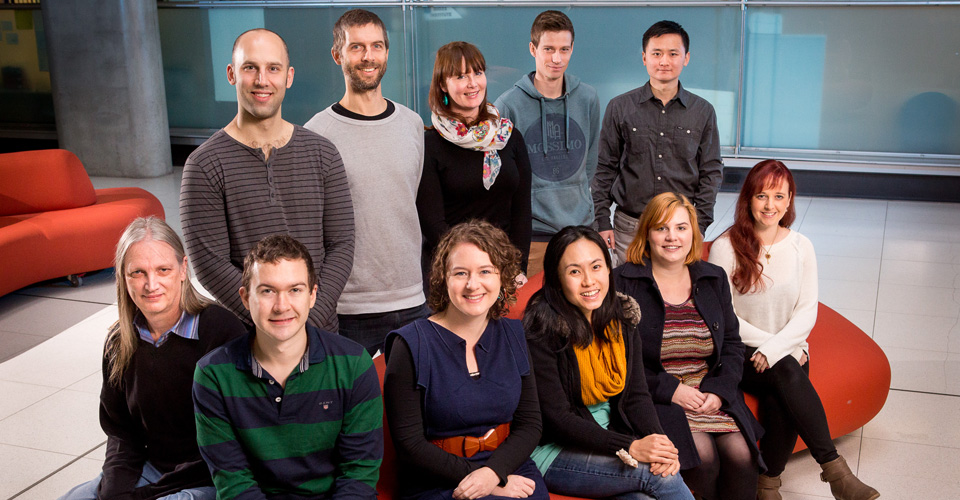Holt Group

“We use high-throughput platforms to sequence the complete genomes of drug-resistant and drug-susceptible bacterial pathogens, to investigate: how the resistance genes spread; where and into which bacteria they spread; how they impact the population structure of pathogens.” – Associate Professor Kathryn Holt
Research
Kathryn Holt's research interests include
- Pathogen genomics and bioinformatics
- Bacterial populations
- Bacterial communities
Pathogen genomics and bioinformatics
We focus on two main areas of bacterial genomics:
- Genomic epidemiology, or the study of bacterial pathogen populations
- Metagenomics, or the study of bacterial communities
Bacterial populations – pathogen genomic epidemiology
We use whole genome sequencing to study populations of bacteria that contribute to disease in Australia and developing countries. This includes in-depth studies of microevolution in specific pathogen populations (e.g. Salmonella Typhi, typhoid; Shigella sonnei, dysentery; Klebsiella pneumoniae, pneumonia, UTI and other infections), using next generation sequencing technologies to sequence and compare the genomes of hundreds of closely related isolates of the same pathogen.
In these studies, the minor differences between isolates (e.g. between Salmonella Typhi isolated from different typhoid fever patients in a particular location) are of most interest as they reveal how the pathogen is evolving in response to selective pressures (e.g. exposure to antibiotics, vaccine-induced immunity, or natural host immunity).
Focus areas:
- antibiotic resistance
- transmission, infection control and public health
- novel bioinformatics methods to interrogate genome data
- developing bioinformatics tools suitable for use in public health laboratories
Specific pathogens under study:
Salmonella Typhi and Paratyphi A (typhoid fever)
other Salmonella (food poisoning)
Shigella (dysentery)
Listeria (food poisoning)
Klebsiella pneumoniae (hospital acquired infections)
Acinetobacter baumannii (hospital acquired infections)
Bacterial communities
While some bacteria are pathogenic, meaning they make us sick, most of the bacteria we encounter are not pathogenic and live inside our bodies as commensal microorganisms. In fact, for every human cell in our bodies, there are about 10 bacterial cells. These communities of bacteria are a part of healthy human physiology and are referred to as the ‘human microbiome’.
We use high-throughput sequencing to profile the microbiome of the nasopharynx in cohorts of children, to see how their bacterial communities change during childhood and how the communities are related to the development of non-bacterial disease, including the severity of viral infections of the lung and the development of asthma and allergy.
We are a computational lab, but work closely with collaborators in other research, public health and hospital labs to develop projects and generate data. We then use a combination of phylogenetics, sequence analysis, comparative genomics, spatiotemporal analysis and epidemiological methods to analyse and interpret the data. Much of this is done using high performance computing, including the Victorian Life Sciences Computation Initiative (VLSCI) at the University of Melbourne.
Techniques
- Alignment, assembly and annotation of high throughput sequence data
- Variant calling and analysis
- Comparative genomics and pan-genome analysis
- Phylogenetics
- Evolutionary analysis
- Geospatial analysis and phylogeography
- Bacterial typing and genomic epidemiology
- 16S microbiome analysis
Group Members
Laboratory Manager
Louise Judd
Postdoctoral Scientists
Jane Hawkey
Kelly Wreys
Margaret Lam
Zoe Dyson
Sebastian Duchene
Research Assistants
Ryan Wick – Data visualisation, Bandage developer
Graduate Students
PhD Students
Claire Gorrie – K. pneumoniae genomic epidemiology
David Edwards
Stephen Watts
Yu Wan
Youwen (Owen) Qin
Cassie Litchfield
Masters Student
Macgregor Todd
Honours Student
Alexander Tokolyi
Biography
Associate Professor Kathryn Holt is currently a NHMRC Career Development Fellow and a Senior Research Fellow at the University Of Melbourne.
Kat has a double degree BA/BSc at the University of Western Australia, majoring in Biochemistry, Applied Statistics and Philosophy, with Honours in Genetics (focusing on plant gene expression). After a short stint in the Bioinformatics Division at the Walter and Eliza Hall Institute, Kat went to the University of Cambridge to undertake a PhD in Molecular Biology at the Wellcome Trust Sanger Institute. There she studied the genomics of typhoid fever, under the supervision of Gordon Dougan, Julian Parkhill and Duncan Maskell.
In 2010 Kat returned to Australia to take up an NHMRC Early Career Fellowship in the Department of Microbiology and Immunology at the University of Melbourne. While working as a research fellow, she also undertook a Masters in Epidemiology at the University of Melbourne, graduating in 2011.
In late 2012, Kat was recruited to a lab head position in the Department of Biochemistry and Molecular Biology at the University of Melbourne, and established a lab at the Bio21 Institute. The research group is currently funded by several external grants (see current projects) and Kat has recently been awarded a L’Oréal For Women In Science Australia & NZ Fellowship (2013), the NHMRC Research Excellence Award for the Top-Ranked Career Development Fellow (2014) and a L’Oreal-UNESCO Rising Talents Fellowship (2015).
In 2016, Dr Kathryn Holt from the Department of Biochemistry and Molecular Biology has been named the Gottschalk Medallist at the Australian Academy of Science’s annual honorific awards.
In 2017, Kat Holt was announced as an HHMI International Research Scholar.
A list of Kat’s publications can be found via Google Scholar. Kat is a Senior Editor of the new journal Microbial Genomics, published by the UK Society for General Microbiology.

